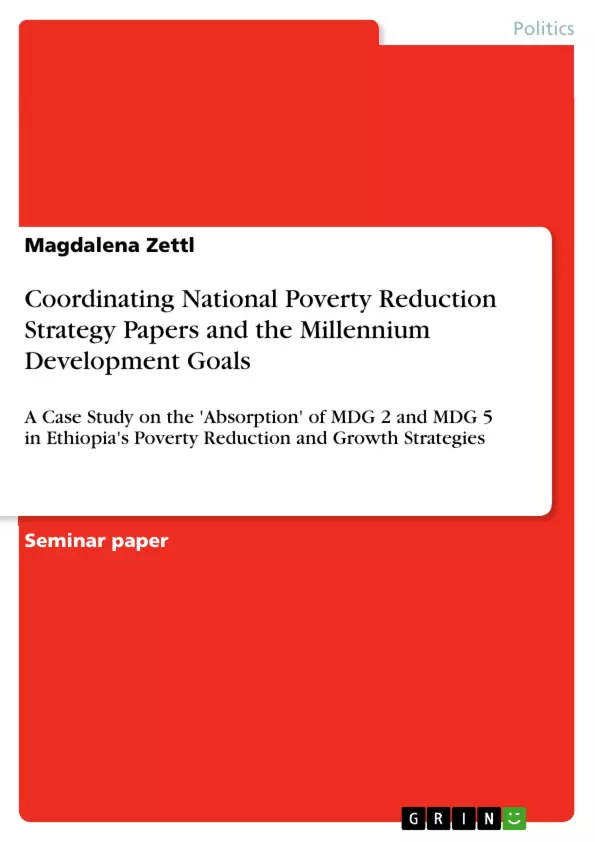Poverty reduction strategy papers (PRSPs) are claimed to be the 'crucial link' between the Millennium Development Goals (MDGs) on the global level and poverty reduction and growth strategies on the nation level as PRSPs incorporate more and more MDG goals and indicators. Ethiopia, a low-income country in Sub-Saharan Africa, is used as a case study as it has not only made significant advancements in terms of achieving the MDG goals since 2000 but has also made extensive use of PRSPs. Ethiopia has already issued its third generation of PRSPs (2002; 2006; 20011), including an interim PRSP in 2000. The essay analyzes how well MDG 2 'Primary Universal Education' and MDG 5 'Maternal Health' have been absorbed into Ethiopia's PRSPs. Findings confirm that PRSPs are a crucial means to implement MDGs within national policies and programs. Moreover, the study hints to how different processes of MDG incorporation into PRSPs influence the achievement of the respective MDGs on the national level. PRSPs have to be given considerable importance in the post- 2015 agenda; however, a revision of PRSPs is urgently needed to compensate PRSP's criticism and its lack in adhering to some of its most crucial principles, which play a significant role in the post 2015 agenda.
Inhaltsverzeichnis (Table of Contents)
- Introduction
- Context
- Poverty Reduction Strategy Papers
- Development background: Ethiopia
- MDGs and PRSPs in Ethiopia
- 'Absorption' of MDGs in Ethiopia's PRSPs (2000-2015)
- Case study I: MDG 2 and educational policies in Ethiopia
- Case study II: MDG 5 and health policies in Ethiopia
- Possible explanations for different levels of MDG absorption into Ethiopia's PRSPs
- Outlook of PRSPs in terms of the post-2015 Agenda
Zielsetzung und Themenschwerpunkte (Objectives and Key Themes)
This paper analyzes how the Millennium Development Goals (MDGs), particularly MDG 2 ('Primary Universal Education') and MDG 5 ('Maternal Health'), have been incorporated into Ethiopia's Poverty Reduction Strategy Papers (PRSPs). It investigates the relationship between global development goals and national policy implementation, focusing on the specific context of Ethiopia.- The effectiveness of PRSPs in achieving MDG targets
- The role of PRSPs in shaping national development policies
- The impact of different levels of MDG absorption on national progress
- The future of PRSPs in the post-2015 development agenda
- Challenges and limitations of PRSPs in addressing cross-cutting poverty issues
Zusammenfassung der Kapitel (Chapter Summaries)
- Introduction: This chapter introduces the concept of Poverty Reduction Strategy Papers (PRSPs) and their relationship to the Millennium Development Goals (MDGs). It highlights the role of PRSPs in facilitating poverty reduction in low-income countries and the potential challenges associated with their implementation.
- Context: This chapter provides a comprehensive background on the case study of Ethiopia, including information about its poverty levels, economic development, and relationship with PRSPs and the MDGs. It explores the country's progress towards achieving the MDGs and the role of PRSPs in shaping its development agenda.
- 'Absorption' of MDGs in Ethiopia's PRSPs (2000-2015): This chapter examines the integration of MDG 2 ('Primary Universal Education') and MDG 5 ('Maternal Health') into Ethiopia's PRSPs, analyzing how the MDG targets and indicators have been adopted in national policies. The chapter investigates the processes of incorporating these goals into PRSPs and explores possible explanations for the different levels of absorption.
- Outlook of PRSPs in terms of the post-2015 Agenda: This chapter discusses the implications of PRSPs for the post-2015 development agenda, focusing on the challenges and opportunities associated with utilizing this policy framework in the context of the Sustainable Development Goals (SDGs). It considers the potential limitations of PRSPs in addressing complex poverty issues and the need for possible revisions to enhance their effectiveness.
Schlüsselwörter (Keywords)
The key terms and topics explored in this paper include Poverty Reduction Strategy Papers (PRSPs), Millennium Development Goals (MDGs), Ethiopia, primary education, maternal health, development policy, poverty reduction, cross-cutting poverty issues, sustainable development, and the post-2015 agenda.Frequently Asked Questions
What are Poverty Reduction Strategy Papers (PRSPs)?
PRSPs are national strategies that serve as the link between global development goals (like the MDGs) and local growth policies in low-income countries.
What is the focus of the Ethiopia case study?
The study analyzes how well MDG 2 (Primary Universal Education) and MDG 5 (Maternal Health) were integrated into Ethiopia's national PRSPs between 2000 and 2015.
Did Ethiopia succeed in achieving MDG goals?
The study confirms that Ethiopia has made significant advancements in achieving MDG goals since 2000 through the extensive use of PRSPs.
How do PRSPs help implement global goals?
They act as a crucial means to absorb international indicators and targets into national policies, programs, and budget allocations.
What is the "post-2015 agenda" mentioned in the paper?
It refers to the transition from the Millennium Development Goals to the Sustainable Development Goals (SDGs) and how PRSPs need revision to fit this new framework.
What are the criticisms of PRSPs?
Criticisms include a lack of adherence to core principles and potential difficulties in addressing complex, cross-cutting poverty issues effectively.
- Arbeit zitieren
- Magdalena Zettl (Autor:in), 2012, Coordinating National Poverty Reduction Strategy Papers and the Millennium Development Goals, München, GRIN Verlag, https://www.grin.com/document/266410



